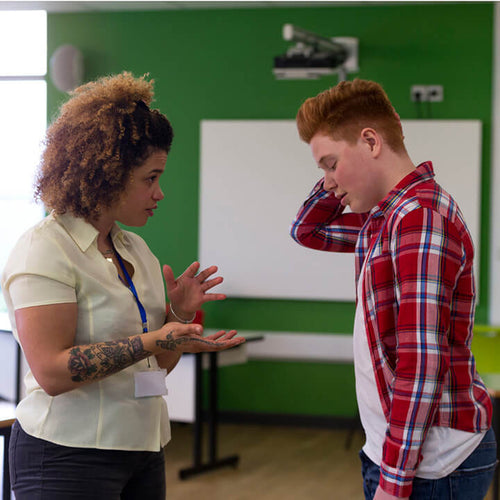Often educators tell us that the biggest challenge that they face in their profession is with kids who are capable but won’t do their work. We have learned that there are many reasons for underachievement in students, and understanding those reasons is the critical first step in helping motivate an underachieving student. Although there are many helpful strategies available to help teachers, Love and Logic educators understand that the process of improvement can be very slow.
Roots of Underachievement
Humans are born with an intense drive to learn, explore, and master their environment. In fact, our brains produce biochemicals that reward these activities and make us feel good when we succeed in these efforts. However, there are challenges that can hinder this process and ultimately lead to chronic underachievement.
We all have basic needs that must be met before we can feel safe enough and relaxed enough to experience curiosity, creativity, innovation, and ultimately academic achievement. These needs can be broadly categorized as physical needs, personal safety, love and belonging, and healthy self-esteem. When all these needs are met, we are able realize our full potential, meet life’s challenges in healthy ways, and achieve our goals. When these needs are not met, we tend to be anxious, tense, nervous, and full of fear, thus preventing us from reaching our full potential—no matter how capable we are.
Strategies for Reaching Underachieving Students
When confronted with kids who are not reaching their full potential, it is important to determine if there are basic needs that are not being met. The best way for educators to accomplish this is to build a positive teacher-student relationship, which is one of the goals of teachers who use Love and Logic. Here are some Love and Logic strategies that can help teachers understand the needs of an underachieving student—and ultimately instill the love of learning in their hearts and minds.

Apply the One-Sentence Intervention
Love and Logic’s One-Sentence Intervention is intended to help teachers connect with students in a relatively neutral manner. Apply the One-Sentence Intervention at least twice a week by noticing something unique about the student and sharing it with them. For example, whisper something like, “I noticed that you like to draw. I noticed that.” Do not judge or make a comment about what the student is doing, simply notice it.
Stop Consequences and Punishment
Too often people try to motivate students by using consequences or punishments as incentives. This simply creates more harm than good when students are struggling with underlying issues that are blocking their natural abilities. Love and Logic educators understand that the solution to underachievement is more related to building a positive teacher-student relationship and meeting other underlying needs, rather than administering consequences or punishments.
Place Primary Emphasis on Successes
Instead of dwelling on failures and obsessing over weaknesses, it is far better to focus on successful experiences and concentrate on natural strengths with reluctant or unmotivated students. We have seen that with resistant and apathetic students, Love and Logic educators are more successful if they notice at least ten successes for every one failure. These teachers also encourage parents to do the same with their kids who are struggling.
Use Sincere Empathy
The hallmark of Love and Logic is sincere empathy. This is critically important when working with an unmotivated student. As a teacher works with the student, mistakes are inevitable and will be common at first. Reacting in an empathetic manner to mistakes can transform the interaction from a potential power struggle into an opportunity for the student to learn and accept ownership. At Love and Logic, we believe that no approach will be successful without a healthy dose of genuine empathy.
Love and Logic isn’t just a collection of classroom management tips, it’s a lifeline for educators who want to inspire their students to learn, care, and thrive. Our classic book, Teaching with Love and Logic: Taking Control of the Classroom, contains practical strategies, heartfelt stories, and proven techniques, which can equip teachers with the tools needed to address the emotional and behavioral challenges of unmotivated students.
Thanks for reading!














